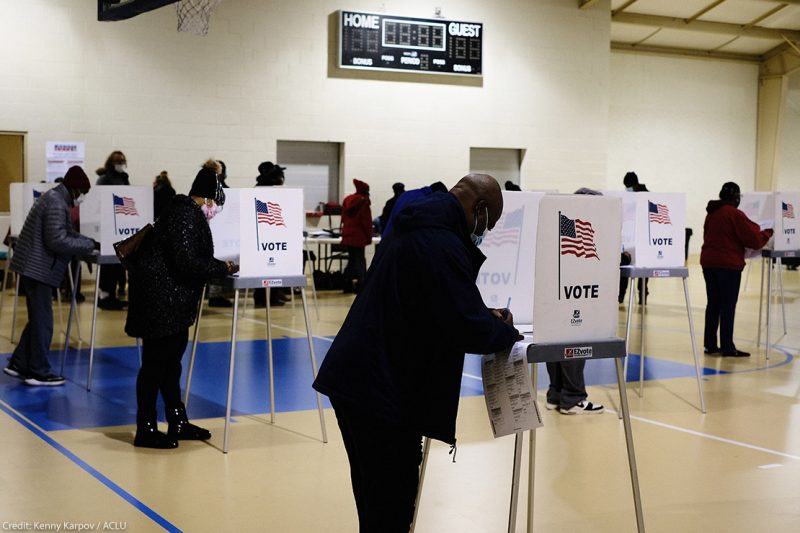Amidst a Wave of Voter Suppression Bills, Some States Expand Access to the Ballot


This post was updated on May 17, 2021.
The struggle for the right to vote is underway at state legislatures throughout the country. Following record in the 2020 election, politicians are drumming up false concerns and baseless conspiracies about widespread voter fraud to justify suppressing the right to vote. More than have been introduced in 47 states. These bills seek to make it more difficult for people to register to vote, vote by mail, or vote in person.
But voter suppression is only half of the story. In contrast, many other states have learned lessons from the successes of the 2020 election and are seeking to expand access to the ballot. Here are some of the most significant developments at state legislatures this year.
In Georgia, every method of casting a ballot is under attack
On March 30, the ACLU and civil rights groups filed a federal lawsuit against Georgia’s newly enacted sweeping law that makes it much harder for all Georgians to vote, particularly voters of color, new citizens, and religious communities. The law being challenged is , which was passed by the Georgia House of Representatives and Senate and signed by Gov. Brian Kemp in under seven hours on March 25.
The lawsuit challenges multiple provisions in S.B. 202, including the:
- ban on mobile voting
- new narrow identification requirements for requesting and casting an absentee ballot
- delayed and compressed time period for requesting absentee ballots
- restrictions on secure drop boxes
- out-of-precinct provisional ballot disqualification
- drastic reduction in early voting in runoff elections
- and, perhaps most cruelly, ban on “line warming,” where volunteers provide water and snacks to Georgians, disproportionately those of color, who wait in needlessly long lines to cast their vote.
These elected officials’ actions follow the 2020 presidential election and the 2021 runoff elections for two seats to the U.S. Senate that saw record turnout of voters, particularly Black voters, in Georgia. The ACLU, ACLU of Georgia, NAACP Legal Defense and Educational Fund, Inc. (LDF), Southern Poverty Law Center (SPLC), and law firms WilmerHale and Davis Wright Tremaine brought the case on behalf of the , , , , and
Iowa passes voter suppression bill limiting early voting and vote by mail
The governor of Iowa signed earlier this month that will greatly damage access to the ballot. The law cuts nine days of early voting, shortens the timeline for requesting and returning an absentee ballot, and requires that poll places close an hour earlier on Election Day. This bill was supported by politicians that could not provide a single case of voter fraud that the bill would prevent. A new
Florida passes bill to restrict access to vote by mail
Nearly 5 million Floridians cast their ballots by mail in 2020, and more than 1.5 million used a drop-box to return their ballot. As a direct response to this voter participation, the Florida legislature passed and the into law legislation that will limit ballot drop box availability, target groups helping register voters in their communities, and create hardships for individuals to request and return a vote-by-mail ballot.
In Montana, registration and voting may become much more difficult, especially for Indigenous and rural voters
On May 17, 2021, the ACLU, ACLU of Montana, and Native American Rights Fund (NARF) challenged two new Montana laws that hinder Native American participation in the state’s electoral process.
The first, HB 176, ends same-day registration, which reservation voters have relied upon to cast votes in Montana since 2005. The second, HB 530, blocks organized ballot collection on rural reservations. Just last year, a after listening to “cold, hard data” on its detrimental impact on the Native vote.
The lawsuit against HB 176 and HB 530 was brought on behalf of Western Native Voice and Montana Native Vote, Native American-led organizations focused on getting out the vote and increasing civic participation in the Native American community; and the Blackfeet Nation, Confederated Salish and Kootenai Tribes of the Flathead Reservation, Fort Belknap Indian Community, and Northern Cheyenne Tribe.
Rural reservations are the most isolated voter locations in Montana. The distance to travel to register and vote, limited mail routes, disproportionately high levels of poverty on reservations, and digital divide issues isolate Native Americans from participating in the political process.
To overcome these barriers, many rely on same-day voter registration so they can make just one trip to the polling center to register and vote on the same day. Native Americans living on reservations disproportionately rely on same-day registration, especially voters on the Blackfeet Nation reservation in northwest Montana.
Kentucky, Delaware, and Vermont are poised to expand access to the ballot
After learning beneficial lessons from the 2020 election, the Kentucky legislature expanded access to the ballot. The governor signed into law bipartisan legislation that will offer the opportunity to vote early to all voters in Kentucky. Kentucky joins in providing in-person early voting.
In Delaware, the general assembly is considering a variety of measures to improve access to the ballot. and same-day registration will be considered this session. Additionally, many state legislators are pushing to to allow no-excuse absentee voting, which will open the door to permanent vote by mail options for Delawareans.
The Vermont Senate recently that would allow for universally mailed ballots to be sent to every active registered voter. If passed, Vermont would be the in the nation to adopt this policy.
The ACLU is combating legislation to suppress the right to vote in state legislatures, while at the same time advocating for policies that will expand access to the ballot. We need no excuse absentee voting, same day registration, automatic voter registration, and access to in-person early voting for every eligible voter. We won't stop fighting until every eligible voter can cast their ballot. Let people vote!



